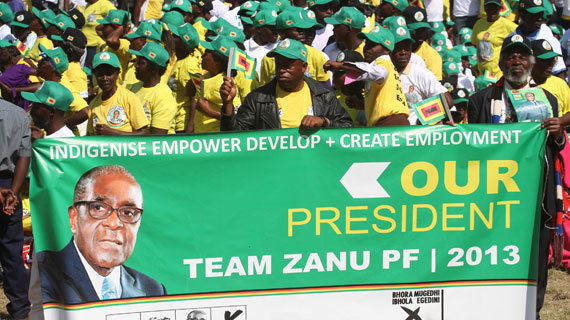
FRIDAY July 31 marked exactly two years after the 2013 harmonised elections. What prevails today is a case of unfulfilled promises and hopelessness in the country whose economic fortunes continue to tumble.
BY MOSES MATENGA
Zanu PF won the elections with over two-thirds majority and promised to create 2,2 million jobs over five years by unlocking value from idle assets worth at least US$1,8 trillion of mineral claims or reserves.
But two years down the line, the country is in a state of paralysis with thousands losing their jobs almost weekly. Analysts who spoke to The Standard said the Zanu PF government had failed the people and it was time for President Robert Mugabe and his team to go.
“In the past two years, the Zanu PF government has focused largely on its own internal party problems than on national issues,” political analyst, Takura Zhangazha said. “It has spent more time dousing its internal fires and changing its internal configuration as opposed to governing in a universal fashion and on non-partisan basis.” Social commentator and blogger Blessing Vava said the fact that Zanu PF had failed was not a secret, as by the party’s own admission, its policies had failed to take off.
“It is no longer a secret that Zanu PF has failed to fulfil its election promises two years down the line and Zim Asset has essentially failed to turn around our economy,” said Vava.
“The future looks bleak under a Zanu PF government as Zimbabwe is further isolated on the global stage. Maybe Zimbabwe needs another coalition government. Opposition parties need to come together and field one candidate if they are to dislodge Zanu PF,” he said.
MDC-T spokesperson Obert Gutu said the Zanu PF regime had failed to rescue the national economy from an endless tailspin that has led to workers losing their jobs in the formal sector as companies and industries close down. “Thousands of people have been thrown onto the streets in the past few days alongside over 60 000 that have lost their jobs in the past two years,” Gutu said.
- Chamisa under fire over US$120K donation
- Mavhunga puts DeMbare into Chibuku quarterfinals
- Pension funds bet on Cabora Bassa oilfields
- Councils defy govt fire tender directive
Keep Reading
“Robert Mugabe might have successfully managed to rig the elections on July 31 2015 but he has certainly dismally failed to rig the economy. The end game is beckoning.”
Gutu said the past two years had been characterised by unprecedented economic stagnation and socio-political decay underpinned by a severe liquidity crunch.
“Poverty and destitution have escalated and millions of Zimbabweans are now living like scavengers and beggars in their own country. Many companies and industries have closed down and the national revenue base has shrunk considerably as the economy goes into despair and hopelessness. Everything that can go wrong has already gone wrong,” he said.
Zanu PF spokesperson Simon Khaya-Moyo on his own admission said Zim Asset had failed to realise its target. He made the disclosure while addressing an International SMEs expo in Harare last week. In the party’s 2013 manifesto, Mugabe stated that the party would work on addressing the challenges caused by the inclusive government.
“This policy will create dignified employment, especially for the youth, distribute wealth amongst citizens more equitably, and cause a general improvement in the quality of life of every Zimbabwean.” But two years on, thousands of youths have been reduced to vendors, wantonly harassed by the municipal police everyday. The Zanu PF manifesto promised to provide every Zimbabwean with a high quality life in terms of “access to decent work or employment, reliable transport, quality education, good health, decent housing or shelter, water and sanitation.” The party also promised the government would build 1,25 million houses to clear the national housing backlog. But housing for all has remained a pipedream as the Zanu PF government has instead focused on demolition of houses. The manifesto said the cornerstone of Zanu PF’s reform programme was indigenisation and economic empowerment. But the indigenisation policy appears to have failed amid allegations that top government and ruling party officials, as well as some traditional leaders, have abused the Community Share Ownership Trusts which were touted as the panacea to empowerment at grassroots level.











